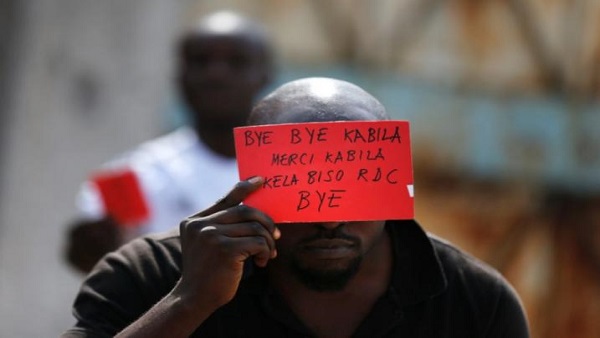A Congolese opposition party supporter displays a red card against President Joseph Kabila in Kinshasa.Photo Credit: Reuters.
Hundreds of people gathered in the Democratic Republic of Congo’s capital, defying a ban on protests against the president’s plans to stay in office past the end of his term on Monday.
Security forces blocked access to Kinshasa University, facing off against groups waving red cards telling President Joseph Kabila to go, as time ticked down to the official close of his mandate at midnight.
Shops shut in other parts of the city, where streets were mostly empty. Militia fighters raided a jail in the eastern Congo city of Butembo in a bid to free prisoners, triggering clashes that killed at least six people, a security source said.
“They want to take advantage of the day,” activist Fabrice Kakubuzi told Reuters.
Opposition activists have accused Kabila of trying to cling to power by letting his term run out without an election in place to choose a successor.
“Kabila’s mandate finishes at 1159 … Tomorrow (Tuesday) it will be chaos,” said Hugue Ilunga, a 21-year-old mechanics student, as dozens of soldiers deployed nearby in the capital, an opposition stronghold of 12 million people.
The government and elections officials have blamed logistical and financial problems for the delay in the vote, currently scheduled for April 2018.
Some opposition leaders have agreed Kabila can remain in office until that date. The constitutional court has also ruled that Kabila, leader since his father was assassinated in 2001, can stay on.
But the main opposition bloc rejects the deal as a ploy, though it said it would not call protests. Talks mediated by the Catholic church failed to reach a compromise.
“FLIRTATION WITH DISASTER”
The government has blocked most social media and outlawed protests in Kinshasa, raising fears of more violence in a nation that has been plagued by war and instability for two decades since the fall of kleptocrat Mobutu Sese Seko. Congo has not seen a peaceful transfer of power since independence in 1960.
Diplomats fear any escalation of the violence could trigger a conflict like the 1996 to 2003 wars that killed millions, sucked in neighboring armies and saw armed groups clash over Congo’s mineral wealth and use mass rape as a strategic weapon.
U.S. Great Lakes envoy Tom Perriello on Thursday called Kabila’s hanging on “an entirely unnecessary flirtation with disaster” in a speech at the United States Institute of Peace.
Youth activists say they have taken inspiration from Burkina Faso, where Blaise Compaore was ousted in 2014 by popular protests while trying to extend his 27-year rule.
As in Burkina, protests in Congo are in part driven by economic desperation. Congo is Africa’s biggest miner of copper and metals used in gadgets, like cobalt and coltan, but a slowdown linked to falls in commodity prices has triggered steep budget cuts and a 30 percent fall in the Congolese franc.
The vast, forested country of 70 million people and more than 200 ethnic groups, is much more fragmented than Burkina, however, and previous protests achieved little.
Former colonial master Belgium advised citizens to leave before Monday. The United States warned against non-essential travel, telling expatriates who remain to stay indoors.
Source: Reuters


